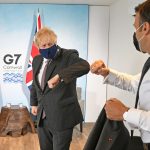A man in an orange top is the self-styled leader of the group of asylum seekers we’ve arranged to meet.
“They feel angry every day,” he says, waving his arms.
The anger is for multiple reasons. It’s about the months and years they’ve spent waiting for their claims to be processed; complaints about the standard of the hotels and the food they’re given; and in particular now about being moved by the Home Office.
Between them, this group of around half a dozen men has just been relocated to the new accommodation where we meet.
They’ve been moved from two hotels in east London where there were stand-offs with the Home Office over some asylum seekers’ refusals to leave the capital.
They say they didn’t want to come to the new accommodation because it’s an hour and a half away and they had “settled” in London.
But against this backdrop of frustration and anger, the government has announced it’s hired a barge where it will house 500 asylum seekers off the Dorset coast.
It says the move will start to reduce hotel costs of £6m a day.
The barge is currently off the coast of Genoa in Italy.
The man in the orange top is called Sadam and is from Sudan. I ask him what he will do if he is asked to move again.
“No, I can’t move,” he says. “I will make protest. All the people here, I invite them to make protest in front of [the] hotel.”
It’s not clear exactly who the government plans to send to the barge.
Read more UK news:
Man admits murdering his wife and their two children
What life is like under witness protection
Please use Chrome browser for a more accessible video player
I ask another asylum seeker called Imad, also from Sudan, what he will do if the government decides he has to go to a barge.
“I don’t want to go,” says Imad. “I [would] go homeless.”
Be the first to get Breaking News
Install the Sky News app for free
By “going homeless”, Imad means he’ll disappear from the asylum system – living outside of society.
It’s something we’re increasingly hearing from people who also tell us they’re afraid of being sent to Rwanda – another aspect of the government’s strategy to deter people from trying to cross the Channel.






















